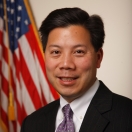
This past Thursday, as the recently appointed co-chair of the White House Initiative on Asian Americans and Pacific Islanders (AAPIs), I had the honor of presiding over a meeting of the Interagency Working Group (IWG).
I could not be more pleased to finally meet and interact with these agency leaders -- their commitment to the AAPI community was clear. As each representative shared their agency’s plans for 2012, it was evident that they clearly understood what was at stake. As last year’s Census data made clear, AAPIs are the fastest growing racial group in the United States. This has created an urgent need to better understand the day-to-day challenges AAPIs face.
In just over a year, the Initiative and the IWG have made considerable progress in meeting the President’s mandate to increase AAPI access to and participation in federal programs. I had the privilege of recognizing several agencies for their outstanding work in key areas.
The Administration has placed an emphasis on recognizing the multi-disciplinary nature of the world around us, breaking down barriers between agencies and offices, and working together to address intractable issues. The Environmental Protection Agency shares this vision of interagency collaboration, and their partnership with the Small Business Administration, the Occupational Safety and Health Administration, the National Institute of Occupational Safety and Health, and the Food and Drug Administration promote safe and healthy workplace environments in an industry where as many as 40% of the workers are AAPI. The notion of interagency collaboration is even more important now that we welcome two new agencies to our working group—the Smithsonian Institution and the newly formed Consumer Financial Protection Bureau.
Data disaggregation is crucial in breaking down the “model minority” myth and demonstrating the diversity among AAPI populations in the United States. The Department of Labor’s recent report, The Asian American Labor Force in the Recovery, presents data on seven specific groups of Asian Americans from the Current Population Survey. Their report helps us better understand the employment challenges for AAPIs across age and gender groups.
Community engagement is the foundation upon which good government policies are built. By listening to our stakeholders and providing them with more information on federal resources, we are able to craft better-informed policies and ensure that our programs reach those most in need of assistance. Through their dozens of roundtables and listening sessions across the country, the Small Business Administration has forged valuable connections between their small business and entrepreneurship assistance programs and AAPI communities. Their engagement efforts continue to strengthen the connection between the AAPI community and the government.
Part of ensuring AAPI participation in the workforce means looking internally at the federal government and assessing AAPI worker involvement at all levels of federal employment. The Office of Personnel Management has supported the creation of the Senior Executive Service Development Program, a program to identify and aid applicants in preparation for the SES selection process through intensive training, education, and mentoring. This program bolsters the career ladder for AAPIs in government and addresses a key AAPI employment gap.
Native Hawaiian and Pacific Islander (NHPI) communities are often marginalized from funding opportunities, and they often suffer from policies that fail to address the unique challenges faced by island communities. The Department of the Interior has consistently demonstrated a commitment to serving the NHPI community, and their continued work with energy will reduce fossil fuel dependency in the U.S. territories of American Samoa, Guam, and the Commonwealth of the Northern Mariana Islands.
Lastly, one agency has stood out for its commitment and achievement in multiple areas. The Department of Health and Human Services has led the charge in engaging AAPI stakeholders and raising awareness about the Affordable Care Act, health care benefits, and Hepatitis B, a disease that disproportionately affects AAPI populations. Additionally, they have made great strides in data disaggregation and collection, both developing new standards for reporting data on race, ethnicity, sex, primary language and disability status and persistently oversampling Asian populations to ensure robust data availability.
While these agencies were recognized for their efforts, it should be noted that all agencies in the IWG should be proud of the steps they have made in working on behalf of the AAPI community. As I sat in our meeting listening to the agency representatives share their plans to engage AAPIs in the year ahead, I was confident that the progress we could achieve can make a world of difference for AAPI communities struggling to access the wealth of resources that the federal government has to offer.
Chris Lu is White House Cabinet Secretary and serves as a Co-chair of the White House Initiative on Asian Americans and Pacific Islanders.


